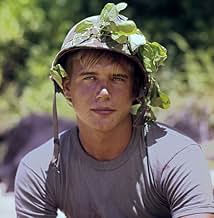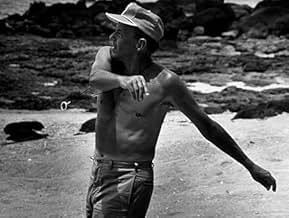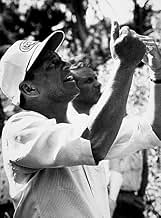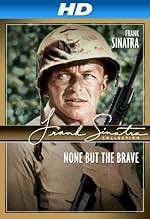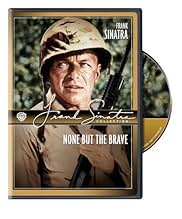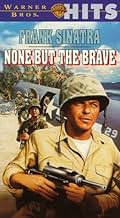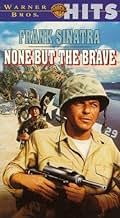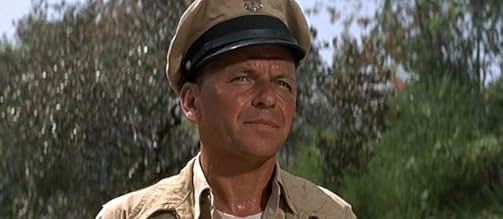NOTE IMDb
6,4/10
2,2 k
MA NOTE
Ajouter une intrigue dans votre langueDuring WW2, a platoon of Marines crash-lands on a tiny Pacific island occupied by a small Japanese unit.During WW2, a platoon of Marines crash-lands on a tiny Pacific island occupied by a small Japanese unit.During WW2, a platoon of Marines crash-lands on a tiny Pacific island occupied by a small Japanese unit.
- Réalisation
- Scénario
- Casting principal
Takeshi Katô
- Sgt. Tamura
- (as Takeshi Kato)
Tôru Ibuki
- Pvt. Arikawa
- (as Toru Ibuki)
Ryûchô Shumpûtei
- Pvt. Okuda
- (as Ryucho Shunputei)
Avis à la une
Like its better known cousin HELL IN THE PACIFIC, NONE BUT THE BRAVE is a story about US and Japanese troops stranded on a desert island during WW2. It's a tense and highly watchable tale that makes Frank Sinatra's sole directorial credit, and he also co-stars in the movie as the medic of the group.
The tale is quite low key and more of a character piece than an action film. There are action scenes here, but they're few and far between and low budget. Nonetheless the film looks classy and expensive with fine cinematography that brings the lush locations to life. As an anti-war piece of filmmaking, it ploughs much the same furrow as HELL IN THE PACIFIC, exploring the way in which all soldiers are the same and the parallels between the two units despite their utmost grievances.
There are some exemplary performances amid the cast members. Clint Walker is exceptional as the nominal group leader and Tatsuya Mihashi his equal as his Japanese rival. Sinatra himself gives an understated performance but the set-piece involving the amputation is the tensest and best in the whole film, a minor acting masterclass from the star. Only Tommy Sands falls apart with a turn that could best be described as a caricature of a real person.
The tale is quite low key and more of a character piece than an action film. There are action scenes here, but they're few and far between and low budget. Nonetheless the film looks classy and expensive with fine cinematography that brings the lush locations to life. As an anti-war piece of filmmaking, it ploughs much the same furrow as HELL IN THE PACIFIC, exploring the way in which all soldiers are the same and the parallels between the two units despite their utmost grievances.
There are some exemplary performances amid the cast members. Clint Walker is exceptional as the nominal group leader and Tatsuya Mihashi his equal as his Japanese rival. Sinatra himself gives an understated performance but the set-piece involving the amputation is the tensest and best in the whole film, a minor acting masterclass from the star. Only Tommy Sands falls apart with a turn that could best be described as a caricature of a real person.
Can circumstances turn bitter enemies fighting for their countries into true friends? None But the Brave attempts to answer this question with a unique look at the relationship between two companies of enemy soldiers during World War II. This 1965 film is a character study of the two groups one American, the other Japanese. Marooned together on an island, they are forced into a reluctant cease-fire in order to help each other survive.
Frank Sinatra plays Chief Pharmacist Maloney, an alcoholic medic. As always, `Ol' Blue Eyes' shines with his great performance, proving how incredibly underrated he is as an actor. His co-stars are Tatsuya Mihashi as Lieutenant Kuroki and Clint Walker as Captain Bourke. The poignant story is told from the perspective of Kuroki, the ranking Japanese soldier. Mihashi performs brilliantly as a man driven to honor his country, but in his heart carries deep hatred for violence and `admires men's works. not their destruction.' Walker's portrayal as Bourke, an American soldier haunted by his past, is outstanding. Kuroki and Bourke's positions are paralleled throughout the film as they struggle to keep their men under control in the middle of nowhere.
Sinatra was more than one of the film's stars. In a bit of multitasking, he also produced and displayed his directing skills in his only directorial endeavor. It is very apparent that the filmmakers tried extremely hard to display fair portrayals of both sides. For instance, there were three writers, Kikumaru Okuda and Katsuya Susaki, both Japanese, and John Twist, an American.
It was surprising that John Williams, credited as Johnny Williams, composed the musical score for this film. This was a rare opportunity to see just how much is skills have evolved since 1965, which of course is to be expected. While the music was entertaining, it did not reach the caliber of most of his soundtracks from around 1974 and up.
This was an excellent motion picture. It gets all points for writing and acting. The directing was quite good. My only criticism is that some of the action scenes could have been more dynamic. Sinatra apparently decided to use a very straightforward approach with the camerawork. This resulted in somewhat stagnant feel to the battle scenes where a slightly different angle would have made all the difference. This may have been on purpose, as this was not a typical shoot 'em up, drag 'em out war film, but had a much more intelligent story.
7 out of 10
Frank Sinatra plays Chief Pharmacist Maloney, an alcoholic medic. As always, `Ol' Blue Eyes' shines with his great performance, proving how incredibly underrated he is as an actor. His co-stars are Tatsuya Mihashi as Lieutenant Kuroki and Clint Walker as Captain Bourke. The poignant story is told from the perspective of Kuroki, the ranking Japanese soldier. Mihashi performs brilliantly as a man driven to honor his country, but in his heart carries deep hatred for violence and `admires men's works. not their destruction.' Walker's portrayal as Bourke, an American soldier haunted by his past, is outstanding. Kuroki and Bourke's positions are paralleled throughout the film as they struggle to keep their men under control in the middle of nowhere.
Sinatra was more than one of the film's stars. In a bit of multitasking, he also produced and displayed his directing skills in his only directorial endeavor. It is very apparent that the filmmakers tried extremely hard to display fair portrayals of both sides. For instance, there were three writers, Kikumaru Okuda and Katsuya Susaki, both Japanese, and John Twist, an American.
It was surprising that John Williams, credited as Johnny Williams, composed the musical score for this film. This was a rare opportunity to see just how much is skills have evolved since 1965, which of course is to be expected. While the music was entertaining, it did not reach the caliber of most of his soundtracks from around 1974 and up.
This was an excellent motion picture. It gets all points for writing and acting. The directing was quite good. My only criticism is that some of the action scenes could have been more dynamic. Sinatra apparently decided to use a very straightforward approach with the camerawork. This resulted in somewhat stagnant feel to the battle scenes where a slightly different angle would have made all the difference. This may have been on purpose, as this was not a typical shoot 'em up, drag 'em out war film, but had a much more intelligent story.
7 out of 10
A plane load of US Marines crashlands on a Pacific Island held by Japanese soldiers during WW2. The Marines include a green lieutenant (Sands), a veteran sergeant (Dexter) and a medic (Sinatra). Clint Walker plays the pilot who is more than just a pilot.
The Japanese have been bypassed by their own and are seeking a way off the island. There are a few skirmishes with the Marines and then a "truce".
But how long will it hold for?
Good characters, story and actors make it worth watching.
The Japanese have been bypassed by their own and are seeking a way off the island. There are a few skirmishes with the Marines and then a "truce".
But how long will it hold for?
Good characters, story and actors make it worth watching.
Over in the trivia section of the IMDb there is a submission that reads something like..."When he (Tommy Sands)divorced Frank's kid (her name is Nancy), Sinatra allegedly saw to it that his (Sand's) career went permanently on the rocks"...or something like that. Statements like that should be followed by telling exactly just how this was accomplished. This film, "None But the Brave" may contain the answer. It was directed (none too well at that) by Mr. Sinatra, and Mr. Sands, in every scene he is in and every line he speaks, gives the most shrill, bizarre, over-the-top, irritating,mind-boggling, irksome, get-the-hook, somebody-please-shoot-him performance ever seen in a movie that had a budget of over $1200. He was not good enough as an actor to have been that bad on purpose. He was not good enough of an actor to have been that bad accidentally. Only a director on a mission can take a performer to the depths reached by Tommy Sands in this film. Thanks a lot, Dad.
On a tiny forgotten island in the Pacific, there a tiny and forgotten Japanese outpost--with men who'd become stuck there with no great hope of rescue. Into this tiny place arrives a crashing airplane filled with US Marines. When they land, hostilities naturally break out between the groups. However, after a while they realize that killing each other will solve nothing and they have to work together to survive--forging an uneasy peace and friendship between enemy combatants.
NONE BUT THE BRAVE is a film that is a real product of the times. Had anyone wanted to make such a film in the 1940s, they might just have been strung up for the film's very unusual sensibilities. Unlike older war films, in this one the Japanese are humanized a great deal and it's obvious that the film was made during the anti-war 60s (though early in the anti-war years). In many ways, this is a good thing--showing that people on both sides could be decent. Though in some ways the whole thing seemed a bit hard to believe--after all, very, very few Japanese officers would have admitted to not having faith in the war--this was a very 1960s sentiment.
As for the acting, it was generally good. Clint Walker was clearly the star, though Frank Sinatra had a decent co-starring role in this film that he both produced and directed. The Japanese actors also were pretty good. The only weak point was the way Tommy Sands' character was written--he was like a one-dimensional caricature instead of a real soldier. No young lieutenant is THAT obnoxious and stupid!!
Overall, an entertaining film but one that strains credibility, as the concept behind the film just doesn't make much sense for the 1940s. Still, if you can stop those voices in your head from complaining about the plot, it's a good and very different movie.
NONE BUT THE BRAVE is a film that is a real product of the times. Had anyone wanted to make such a film in the 1940s, they might just have been strung up for the film's very unusual sensibilities. Unlike older war films, in this one the Japanese are humanized a great deal and it's obvious that the film was made during the anti-war 60s (though early in the anti-war years). In many ways, this is a good thing--showing that people on both sides could be decent. Though in some ways the whole thing seemed a bit hard to believe--after all, very, very few Japanese officers would have admitted to not having faith in the war--this was a very 1960s sentiment.
As for the acting, it was generally good. Clint Walker was clearly the star, though Frank Sinatra had a decent co-starring role in this film that he both produced and directed. The Japanese actors also were pretty good. The only weak point was the way Tommy Sands' character was written--he was like a one-dimensional caricature instead of a real soldier. No young lieutenant is THAT obnoxious and stupid!!
Overall, an entertaining film but one that strains credibility, as the concept behind the film just doesn't make much sense for the 1940s. Still, if you can stop those voices in your head from complaining about the plot, it's a good and very different movie.
Le saviez-vous
- AnecdotesDuring downtime whilst shooting the picture, Brad Dexter saved Frank Sinatra from drowning when he dived into the ocean and rescued the floundering singer.
- GaffesOne African American belongs to the USMC platoon. At this time, US military was not an integrated military and Blacks were segregated. This black Marine couldn't have been a member of this platoon. The USMC was integrated in World War II, as according to the Marine hierarchy, "There is only one color in the USMC, Marine Corps green."
- Citations
Lt. Kuroki: Our island is a little chunk of coral in the Sakhalin archipelago. It is nameless and the Great War beyond its horizons ignores us, for we are the expendables of an amphibious landing, left to God, a forgotten outpost of the Imperial Japanese Army.
- Crédits fousThe line NOBODY EVER WINS appears in place of "The End" just before the end credits start, which is appropriate given the film's anti-war message.
- Versions alternativesSome prints of the film do not include subtitles for any of the Japanese sequences.
- ConnexionsFeatured in Stars of the Silver Screen: Frank Sinatra (2011)
Meilleurs choix
Connectez-vous pour évaluer et suivre la liste de favoris afin de recevoir des recommandations personnalisées
- How long is None But the Brave?Alimenté par Alexa
Détails
- Date de sortie
- Pays d’origine
- Langues
- Aussi connu sous le nom de
- Los valientes mueren de pie
- Lieux de tournage
- Sociétés de production
- Voir plus de crédits d'entreprise sur IMDbPro
- Durée1 heure 46 minutes
- Rapport de forme
- 2.35 : 1
Contribuer à cette page
Suggérer une modification ou ajouter du contenu manquant



